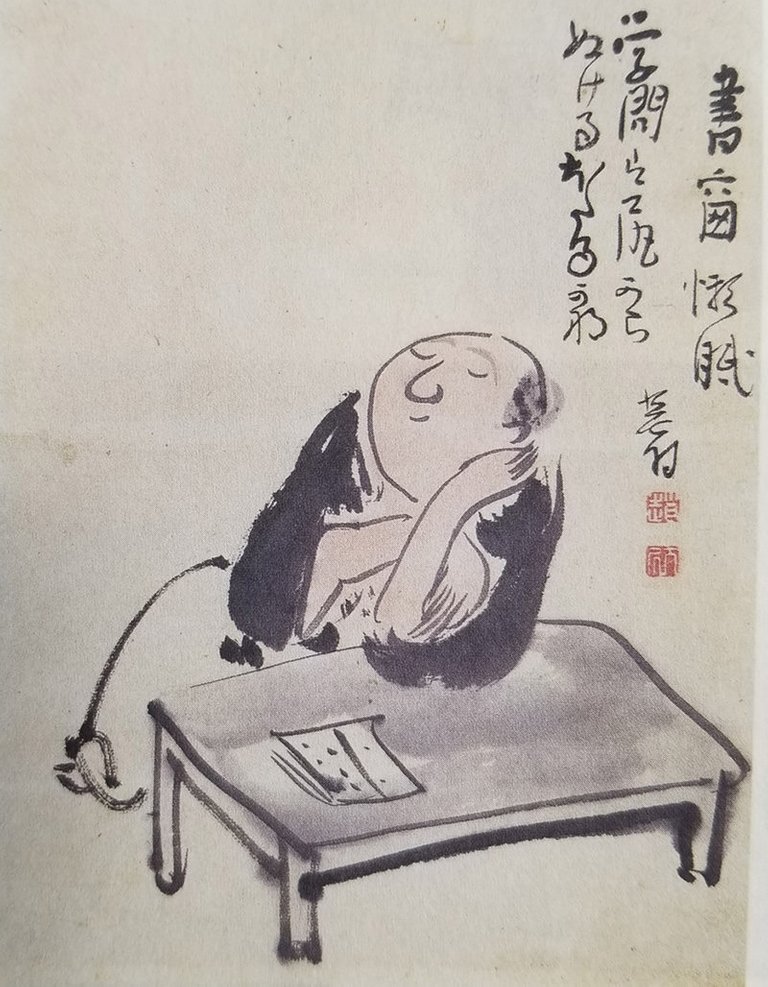學問は尻からぬけるほたる哉
gakumon wa shiri kara nukeru hotaru kana
great learning
quick to vanish
like the light of a firefly
—Buson
trans. David LaSpina[1]

That is a painting by Buson to go along with the poem. Buson often painted the haiku he wrote, a combination called haiga (俳画).
This is a summer haiku, given by the kigo hotaru (蛍, firefly). It is winter as I post this, but we could all use thoughts of warmer weather at the moment.
Most of us think of haiku as always serious, but there is plenty of fun to be had in the form. This one is Buson having fun and making a bit of a joke. The joke hinges on the second line, shiri kara nukeru, which means the same as our idiom "in one ear, out the other", but literally says "coming out of the butt". Now the connection to fireflies becomes clear, with their bums that light up.
There's more at work here though. There is famous Chinese tall-tale about a fellow named Che Yin (车胤), a man from a poor family who couldn't even afford candles to study by at night. The story goes that he caught fireflies and wrapped them in a cloth bag so that he could read at night.
The idea from this old story is illustrated by the phrase keisetsu no kou (蛍雪の功) which literally means "firefly snow success" and is used when your hard work and study has paid off or for expressing the effort itself. There is also a monthly journal for passing the entrance exam for university that has been published since 1941 called keisetsu jidai (螢雪時代), literally "firefly snow era".[2]
The person in Buson's haiku is not quite as studious as old Che Yin, however, and appears to be dozing off. Perhaps he is distracted by the fireflies and is, instead of studying, composing a haiku.
Most translations of this haiku tend to try to be literal, attempting to include the joke or at least some mention of "butt" or "ass", for shock value I suppose. I usually also try to translate literally, but I don't think that works so well for this one. At the risk of losing the humor, I choose to simply go with the suggestion that the gains of studying are just as temporary as the light of a firefly.
But maybe we can do better. The great Keigu[3] often gives multiple translations of a single haiku, reasoning that it is nearly impossible to show all the meanings of the original Japanese in any one English translation. I might do the same, also offering this one to try to hint at the humor of the original:
learning
like a firefly's light
easily escapes me
By the way, Buson originally published this in an anthology created in honor of the 13th anniversary of the death of Kikei, who was the father of his disciple Kitō. Buson purposely wanted to include many humorous haiku in the anthology in order to stand out from the usual more somber memorial anthologies. That's the kind of memorial I want after I'm dead and gone!
 | David LaSpina is an American photographer and translator lost in Japan, trying to capture the beauty of this country one photo at a time and searching for the perfect haiku. |
That is, me! If you like this translation, feel free to use it. Just credit me. Also link here if you can. ↩
"Snow" because whereas the light of fireflies enable you to study at night in summer, the moonlight reflecting off the snow enables the same in winter. Reading or studying with the aid of snow is from yet another old Chinese story, that of Sun Kang (孙康), who was in the same situation as Che Yin but used snow to help him instead of fireflies. ↩
That is Robin Gill, who has published a number of wonderful (and huge) tomes of translations, and writes under the pen name Keigu (敬愚, "Yours foolishly") ↩